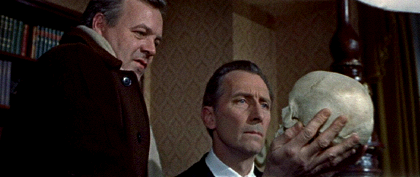Director: Roger Corman
Writers: Charles B. Griffith, Mark Hanna
Producer: Roger Corman
Cast: Beverly Garland, Paul Birch, Jonathan Haze, Morgan Jones, William Roerick, Anna Lee Carroll, Dick Miller, Roy Engel, Gail Ganley, Ralph Reed, Harold Fong, Tamar Cooper, Pat Flynn, Barbara Bohrer, Lyle Latell, (and uncredited cast members) Jan Boleslavsky, Tom Graeff, John Clark, Hank Mann, Charles B. Griffith
Nadine Storey (Beverly Garland) accepts a position as a live-in nurse at the Los Angeles, California home of the stoic and impersonal Mr. Johnson (Paul Birch). Nadine is to administer blood transfusions to Johnson who claims that he is dying from a rare blood disease. Johnson is actually an agent from the planet Davanna and is responsible for a series of murders. The blood that he drains from his victims is sent back to his home planet for analysis. Should the earthling blood prove beneficial to Johnson’s dying race, Davanna will invade Earth and enslave mankind to be cattle for the aliens to feed upon.
The Flashback Fanatic movie review
Not of This Earth is another stellar example of how the right mix of script, pace, performance, and wit make for a very entertaining film, regardless of its low budget and short shooting schedule. I think it is with this film that director Roger Corman really began to hit his stride. While production efficiency and economy were always foremost in Corman’s mind when directing his films, it is no accident that this and many other Corman productions turned out to be fresh and satisfying. Some very savvy preproduction planning allowed him to get things done quickly and properly. Corman also has the taste to be sure that a script has the offbeat elements to distinguish a story while delivering the gimmicks to meet the genre’s audience expectations.
Scriptwriter Charles B. Griffith was one of director Corman’s greatest assets. From a brief story suggestion or genre gimmick, Griffith could develop an interesting story full of snappy dialogue with as much humor as the project required. Griffith, along with co-writer Mark Hanna, provide Not of This Earth with the novel science fiction concepts, wit, and surprises that make all the difference.
Truly using a less-is-more approach, the story employs an interesting sci-fi variation on vampires. This gives us a humanoid menace that is easier to achieve for the filmmakers and more interesting for the audience. Just a pair of milky white eyes capable of frying one’s brain is every bit as startling and probably more effective than the menace of some sort of inhuman monster prop.
This space vampire is also an interesting personality. Always dressed in a business suit and tie, wearing dark glasses to conceal his blank alien eyes, and speaking in a stilted and formal manner, actor Paul Birch still manages to make us believe in his Mr. Johnson as an actual alien being rather than just a stiff caricature. As Mr. Johnson, Paul Birch is both menacing and amusing. However, his character is never played for campy humor. This feels a lot smarter than the in-our-face attempts at postmodern hipness many later films would strive for to compensate for the lack of any originality. Birch’s character is funny when a bit off in his interactions with the “Earth subhumans” and almost earns our sympathy when confounded by traffic laws or a pushy door-to-door salesman. It is light touches like these that make a simple film lively and involving while validating a strange character.
A frequent star in Corman’s ’50s films, Beverly Garland is the heroine. As nurse Nadine Storey, she may end up as a damsel in distress, yet she is intelligent and confident. She provides the film a bit of sex appeal while never being the least bit intimidated by the initial sexual harassment of Mr. Johnson’s ex-con chauffeur Jeremy Perrin (Jonathan Haze).
Jeremy is another example of the cleverness in the screenplay’s character development. At first we assume that he will be just an obnoxious thug deserving punishment. Despite his introductory lechery of Nadine, he actually becomes something of a confidant of hers as they compare notes about their mysterious employer. This is probably Jonathan Haze’s best role. He plays someone that we actually learn to like who also keeps things lively and amusing. Of course, Haze is best known as the dim-witted protagonist Seymour Krelboin of the Corman-directed/Griffith-written 1960 cult comedy The Little Shop of Horrors.
Dick Miller’s brief appearance is always fondly remembered. In one of the film’s best scenes, Miller portrays the persistent door-to-door vacuum cleaner salesman offering a free demonstration of his product. Ironically, Mr. Johnson decides to demonstrate his blood suction device instead.
There are other quirky bits of business in the film that make it truly distinctive: teleportation instead of spaceships used to travel through space, telepathy, a floating umbrella-shaped monster assassin, and rabies-infected blood.
The grimmest aspect in the film is the Nazi-like attitude about the aliens’ plans. No doubt considering themselves a master race, they refer to earthlings as subhumans as if to justify their intent of turning mankind into an enslaved food source. In another unpleasant reminder of World War II atrocities, Mr. Johnson uses his large basement furnace as a body-disposing oven. That all of this takes place in a mundane suburban setting makes the situation relatable while also creating a bizarre and unsettling contrast.
For many years Not of This Earth was the Roger Corman film that I had most anticipated. When I finally got the chance to see it, I found it well worth the wait. Like many of my film favorites, it does not just pacify me; it amuses, surprises, and involves me. That is why this Earth subhuman can’t stop looking at it.



































